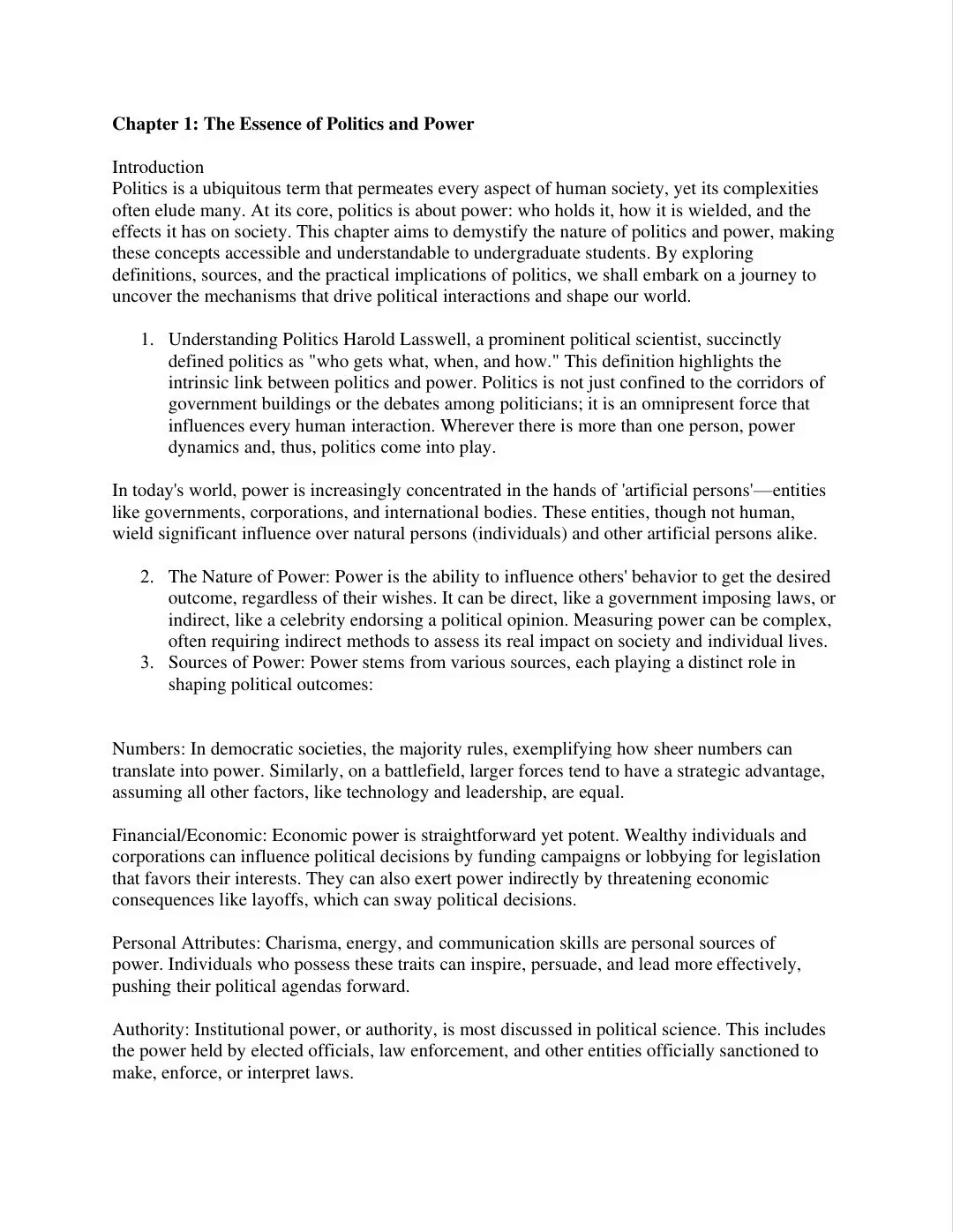
Chapter 1 NO CITATIONS
Scene 1 (0s)
[Audio] Chapter 1: The Essence of Politics and Power Introduction Politics is a ubiquitous term that permeates every aspect of human society, yet its complexities often elude many. At its core, politics is about power: who holds it, how it is wielded, and the effects it has on society. This chapter aims to demystify the nature of politics and power, making these concepts accessible and understandable to undergraduate students. By exploring definitions, sources, and the practical implications of politics, we shall embark on a journey to uncover the mechanisms that drive political interactions and shape our world. 1. Understanding Politics Harold Lasswell, a prominent political scientist, succinctly defined politics as "who gets what, when, and how." This definition highlights the intrinsic link between politics and power. Politics is not just confined to the corridors of government buildings or the debates among politicians; it is an omnipresent force that influences every human interaction. Wherever there is more than one person, power dynamics and, thus, politics come into play. In today's world, power is increasingly concentrated in the hands of 'artificial persons'—entities like governments, corporations, and international bodies. These entities, though not human, wield significant influence over natural persons (individuals) and other artificial persons alike. 2. The Nature of Power: Power is the ability to influence others' behavior to get the desired outcome, regardless of their wishes. It can be direct, like a government imposing laws, or indirect, like a celebrity endorsing a political opinion. Measuring power can be complex, often requiring indirect methods to assess its real impact on society and individual lives. 3. Sources of Power: Power stems from various sources, each playing a distinct role in shaping political outcomes: Numbers: In democratic societies, the majority rules, exemplifying how sheer numbers can translate into power. Similarly, on a battlefield, larger forces tend to have a strategic advantage, assuming all other factors, like technology and leadership, are equal. Financial/Economic: Economic power is straightforward yet potent. Wealthy individuals and corporations can influence political decisions by funding campaigns or lobbying for legislation that favors their interests. They can also exert power indirectly by threatening economic consequences like layoffs, which can sway political decisions. Personal Attributes: Charisma, energy, and communication skills are personal sources of power. Individuals who possess these traits can inspire, persuade, and lead more effectively, pushing their political agendas forward. Authority: Institutional power, or authority, is most discussed in political science. This includes the power held by elected officials, law enforcement, and other entities officially sanctioned to make, enforce, or interpret laws..
Scene 2 (3m 21s)
[Audio] Knowledge and Physical Power: Knowledge is power because informed decisions are usually more effective. Institutions like universities and think tanks concentrate knowledge and thereby power. Physical power, though less subtle, remains a critical component of political power, wielded by military and police forces. 4. Importance of Studying Politics Studying politics is essential for several reasons: Legitimacy and Stability: Understanding politics helps legitimize the power that governments hold and contributes to societal stability by educating the population about the structures and functions of their governance Awareness and Preparedness: Politics affects everyone, whether they actively participate or not. Knowledge of political processes and potential outcomes enables individuals to better anticipate and react to political events. Influence and Change: Armed with political knowledge, individuals and groups are better equipped to influence change or resist it, depending on their goals. Intellectual Curiosity: At a fundamental level, studying politics satisfies the natural human desire to understand the forces that shape our lives and the world around us. Conclusion Politics and power are intertwined in the fabric of human civilization, influencing every interaction and decision. By demystifying these concepts, students can gain a clearer understanding of how their world is shaped by these forces. This knowledge not only prepares them for more informed civic participation but also empowers them to forge a path that can influence political outcomes in their communities and beyond..